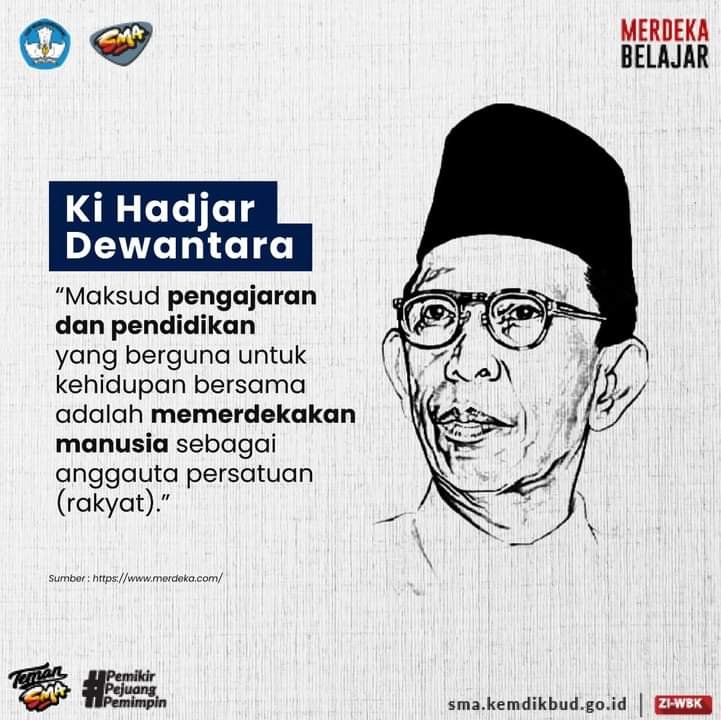
Education, according to Ki Hajar Dewantara, emphasizes the importance of character development alongside intellectual growth. He believed that a strong moral foundation shapes individuals who can contribute positively to society.
Ki Hajar Dewantara championed the idea that education should be inclusive and tailored to each child’s needs and talents. By nurturing a sense of independence and creativity, he paved the way for a holistic approach to learning.
In understanding his vision, we grasp the essence of shaping not just knowledgeable individuals, but compassionate and responsible citizens. This philosophy remains relevant as we navigate the complexities of modern education.
Menurut Ki Hajar Dewantara: A Guide to Education and Character Formation
Ki Hajar Dewantara, a prominent figure in Indonesian education, devoted his life to exploring the meaning of education beyond mere schooling. His ideas, often rooted in Indonesian culture and philosophy, are vital for understanding the importance of character development alongside academic achievement. This article delves deep into the principles of education according to Ki Hajar Dewantara, breaking down his thoughts into various components for easy understanding.
The Philosophy of Ki Hajar Dewantara
Ki Hajar Dewantara believed that education should be a holistic process that nurtures the mind, body, and spirit. His philosophy emphasizes several key components:
- Education as a Natural Process: Dewantara viewed education as a natural process that should align with the stages of human growth. He asserted that children learn best when their natural curiosities are nurtured.
- Character Building: For Dewantara, character building was as important as academic learning. He argued that education should cultivate moral values, discipline, and a sense of responsibility.
- Cultural Relevance: He insisted that education must resonate with local culture. By incorporating local traditions and languages into the curriculum, children develop a stronger sense of identity.
- Freedom in Learning: Dewantara advocated for a system where students feel free to express themselves. This freedom encourages creativity and critical thinking.
These principles form the foundation of Dewantara’s educational approach, which continues to influence educators even today.
Key Principles of Education Menurut Ki Hajar Dewantara
Dewantara established several principles that have shaped educational policies in Indonesia. These principles are essential for designing an effective educational system.
1. Family, School, and Community Collaboration
Dewantara emphasized the importance of collaboration among families, schools, and the community. He believed that education is a shared responsibility. Here’s how this principle manifests:
- Parent Involvement: Parents should actively participate in their children’s education, fostering a supportive environment at home.
- Community Engagement: Schools should engage with the local community, creating opportunities for students to learn from real-world experiences.
- Interdisciplinary Learning: By integrating various subjects and community practices, students can gain a broader perspective.
2. The Concept of “Tut Wuri Handayani”
The essence of Dewantara’s philosophy is captured in the Javanese phrase “Tut Wuri Handayani,” which translates to “Behind, I encourage.” This principle addresses the role of teachers and educators:
- Guidance: Teachers should guide students from behind, allowing them to take the lead in their learning journey.
- Support: Educators need to provide support and encouragement rather than direct control over students’ actions.
- Fostering Independence: By encouraging students to explore and learn independently, educators help build confidence and critical thinking skills.
3. Holistic Education
Dewantara advocated for a holistic approach to education that encompasses various aspects of a child’s development:
- Intellectual Development: Students should engage in learning that challenges their intellect, promoting critical thinking.
- Emotional Intelligence: Education should nurture emotional well-being, teaching students empathy and resilience.
- Physical Education: Physical activity is vital for overall health, helping students learn teamwork and discipline.
The Role of Teachers According to Ki Hajar Dewantara
Teachers play a crucial role in Dewantara’s educational framework. They are not just conveyors of knowledge but also mentors and facilitators of learning.
Characteristics of a Good Teacher
Dewantara highlighted the following traits as essential for effective teaching:
- Empathy: A good teacher understands the emotional and educational needs of students.
- Adaptability: Teachers must adjust their methods to fit the unique learning styles of their students.
- Passion for Education: A genuine love for teaching inspires students and creates a joyful learning environment.
Teacher Training and Professional Development
Dewantara believed that ongoing teacher training is necessary to ensure effective education. This can include:
- Workshops and Seminars: Regular training sessions help teachers stay updated with new teaching methods and technologies.
- Peer Mentorship: Experienced teachers should mentor newcomers, sharing best practices and insights.
- Reflection and Feedback: Teachers should have opportunities to reflect on their teaching and receive constructive feedback.
Implementing Dewantara’s Principles in Today’s Education
Incorporating Ki Hajar Dewantara’s principles into modern educational systems presents both challenges and opportunities.
Creating a Student-Centric Environment
To create a student-centered learning environment, schools can:
- Encourage Student Voice: Allow students to share their interests and shape the learning curriculum.
- Promote Group Work: Foster collaboration among students through group projects and discussions.
- Include Life Skills: Integrate life skills education into the curriculum to prepare students for real-world challenges.
Utilizing Technology in Education
Technology can enhance Dewantara’s educational approach by:
- Online Learning Platforms: Utilizing platforms that offer interactive learning experiences.
- Gamification: Applying game-like elements to make learning more engaging and fun.
- Collaborative Tools: Using digital tools to facilitate collaboration among students and teachers.
Challenges in Implementing Dewantara’s Philosophy
While Dewantara’s ideas are undoubtedly valuable, several challenges may arise in their implementation:
- Resistance to Change: Some educators and institutions may resist changing traditional methods.
- Resource Limitations: Schools, especially in rural areas, might lack the necessary resources to adopt new teaching strategies.
- Training Gaps: There may be a lack of training programs that adequately prepare teachers to implement these principles.
The Impact of Ki Hajar Dewantara’s Philosophy on Indonesian Education
The legacy of Ki Hajar Dewantara is profound, influencing education policies and practices throughout Indonesia. His approach has led to:
- Reform in Educational Practices: Schools across Indonesia have started implementing character education alongside academic subjects.
- Increased Focus on Local Culture: Educators value the importance of local cultures and heritage in education.
- Empowerment of Educators: Teachers are viewed as facilitators and mentors, leading to greater job satisfaction and effectiveness.
His principles are not just relevant for Indonesia but offer valuable lessons for educators worldwide in promoting a more inclusive, supportive, and effective educational environment.
The teachings of Ki Hajar Dewantara remind us that education is not solely about the transmission of knowledge but also about fostering character, creativity, and cultural understanding. By embracing these values, we prepare future generations to be not only knowledgeable but also compassionate and responsible citizens. By focusing on holistic development, we can cultivate individuals who contribute positively to society and embody the values that Dewantara championed.
Ki Hadjar Dewantara, Bapak Pendidikan yang Bersuara Lantang
Frequently Asked Questions
“`html
What are the main educational principles proposed by Ki Hajar Dewantara?
Ki Hajar Dewantara emphasized several essential educational principles, including the importance of fostering character development and promoting national values. He advocated for education that prioritizes the needs of the child, encouraging a holistic approach that considers not only intellectual growth but also emotional and social development. His philosophy included the idea of “among,” which means education should take place in a community environment where teachers guide students collaboratively.
How did Ki Hajar Dewantara contribute to the Indonesian education system?
Ki Hajar Dewantara played a crucial role in shaping the Indonesian education system by founding the Taman Siswa (Student Garden) movement in 1922. This movement aimed to provide an education that was accessible to all, regardless of social class. His efforts focused on creating a curriculum that reflected Indonesian culture and values, promoting a sense of nationalism, and encouraging critical thinking among students. He also fought against colonial education policies that marginalized native Indonesian children.
What influence did Ki Hajar Dewantara have on modern educational practices in Indonesia?
Ki Hajar Dewantara’s influence on modern educational practices in Indonesia is profound. His ideas about education as a means of social empowerment and his emphasis on the role of the teacher as a guide continue to resonate today. Many educational institutions in Indonesia incorporate his principles, focusing on student-centered learning, character education, and fostering a strong sense of cultural identity among students. His legacy is evident in various educational reforms and policies that promote inclusive and meaningful education.
What is the significance of the motto “Ing ngarso sung tulada” in Ki Hajar Dewantara’s philosophy?
The motto “Ing ngarso sung tulada,” which translates to “In front, a model,” highlights the importance of leadership and example in education. Ki Hajar Dewantara believed that teachers and leaders should set a positive example for students. This principle encourages educators to embody the values and virtues they wish to instill in their students, fostering a learning environment based on respect and aspiration. This motto underlines the notion that effective education requires both guidance and exemplary behavior from teachers and leaders.
How does Ki Hajar Dewantara’s concept of “freedom in education” manifest in today’s schools?
Ki Hajar Dewantara’s concept of “freedom in education” advocates for an environment where students can express themselves and engage with their learning actively. In contemporary schools, this manifests through various teaching methods that promote creativity, critical thinking, and independent exploration. Educators encourage students to participate in decision-making regarding their learning processes, offering opportunities for hands-on experiences, group work, and projects that reflect their interests and abilities, thus nurturing a more dynamic classroom atmosphere.
“`
Final Thoughts
Menurut Ki Hajar Dewantara, education plays a crucial role in shaping character and fostering individual growth. He emphasized the importance of nurturing students’ potential through a supportive environment. Dewantara believed that education should not only focus on academic knowledge but also on moral values and social responsibilities.
In essence, his philosophy encourages a holistic approach to learning, where intellectual and emotional development go hand in hand. By integrating these values, we can cultivate a generation that is not only knowledgeable but also compassionate and responsible.




